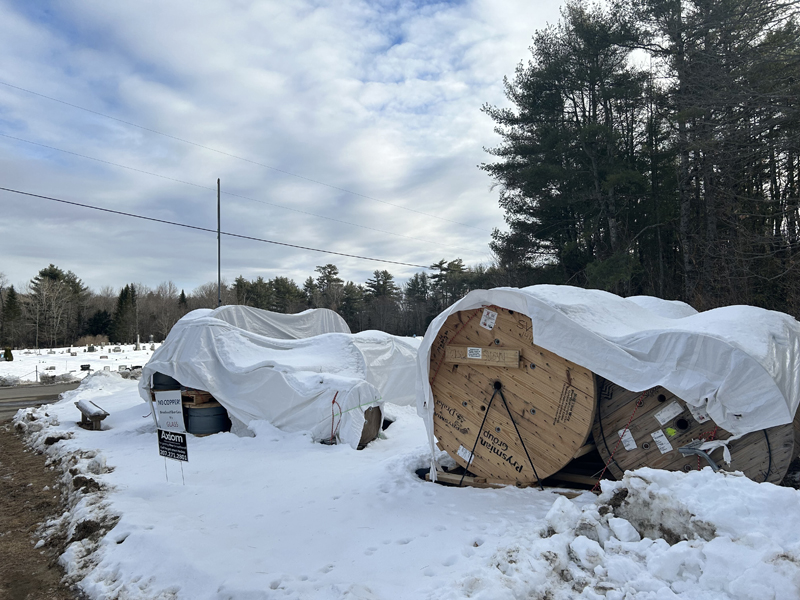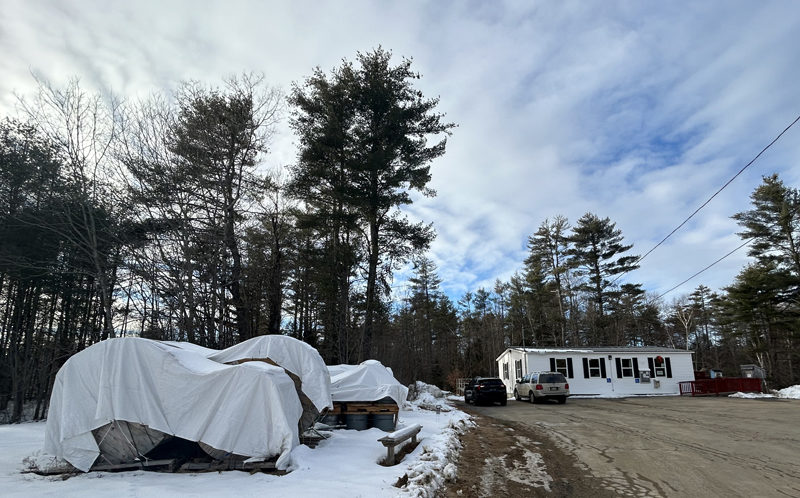
Fiberglass cables draped in tarps outside the Somerville town office on Monday, Feb. 5. This spring or summer, construction will begin on the town’s municipal broadband network, according to members of the Somerville Municipal Broadband Board. (Molly Rains photo)
The coils of fiber internet cables stacked in front of the Somerville municipal office will soon be stretched across the town in the realization of a years-long, volunteer-led effort to bring a municipal broadband service to residents, Somerville Municipal Broadband Board Chair Sharon Reishus said in an interview on Monday, Feb. 5.
However, even as the project forges ahead on the ground, the ongoing face-off between the town and utility Consolidated Communications LLC, over the costs associated with preparing utility poles for the new network has progressed slowly before the Maine Public Utilities Commission.
“This is a fascinating fight going on across most of the rural states … we’re sort of leading the charge,” Reishus said.
Bringing internet to Somerville is “so important, because so many people in town need fast, reliable, high-speed internet access,” Reishus said. “In the future, there’s just going to be more and more of a need for it, for access to telemedicine and education … and even just for fun.”
At present, Somerville residents have limited options when it comes to internet service, Reishus said. Providers, she noted, have historically been disinclined to service the town due to its small population, rural setting, and low population density.
“We’re in this small town that’s spread out, and it just has not been profitable for other companies to service us,” Reishus said.
Though other providers have made short-lived attempts to service the town in the past, Reishus said that at present, residents’ “only option” for internet service is Starlink.
“A lot of people in Somerville can’t afford (Starlink), because it’s quite expensive,” Reishus said.
In addition, tree cover can interfere with Starlink, as the service relies on satellites, making it “not a great solution for people who can’t get a wide enough view of the sky,” she said.
For this reason, the town planned in 2022 to construct a town-owned internet service using funds from Maine Connectivity Authority and National Telecommunications and Information Agency grants.
One hundred percent of construction costs will be covered by the grant funding, Reishus said on Feb. 5. This includes, she noted, the so-called “drop cost” required to extend broadband cables from the street to individuals’ homes, though residents must sign up for service before construction begins in order to take advantage of grant funding.
“Make-ready work” undertaken by the utility companies that own and use Somerville’s utility poles is already ongoing this winter, Reishus said, to prepare the poles to host Somerville’s fiber internet cables.
This is despite the fact that Somerville and the utility that owns many of the poles in town, Consolidated Communications LLC, are engaged in a dispute before the Maine Public Utilities Commission over who should bear the costs of that make-ready work.
The town, Reishus said, is attempting to make use of a Maine statute that ostensibly exempts municipalities from paying make-ready costs for projects that bring internet to underserved communities. Consolidated has said in court filings that the town should bear responsibility for those make-ready costs, and that requiring the company to pay them is unconstitutional.
Other internet providers, including Spectrum Northeast, LLC and Comcast of Maine/New Hampshire have made similar challenges to the statute.
A Rapid Response decision from the utilities commission previously landed in favor of the town. If the current case before the commission is also resolved in Somerville’s favor, the case will “almost certainly” go before the Maine Supreme Court, said Reishus.

Coils of fiber cables await springtime outside the Somerville town office on Monday, Feb. 5. Currently, affordable and viable options for residents to access the internet are few and far between, said Somerville Municipal Broadband Board Chair Sharon Reishus. “We just want (internet) to be an option for people,” she said. (Molly Rains photo)
A victory in the Maine Supreme Court, she said, might have repercussions for rural towns attempting to provide municipal broadband to their residents in Maine and beyond.
“A win would certainly help embolden other states to try and encourage municipal systems,” Reishus said.
Currently, Somerville is paying the fees for make-ready work to Consolidated “under protest,” she said, with the expectation that Consolidated will refund the fees if the courts side with Somerville. In that event, the funding will likely be returned to the federal government, Reishus said.
On the other hand, she noted, a loss – while disappointing – would not harm town residents, since the money for the make-ready fees is coming entirely from grant funding.
“This is really more a case on principle,” Reishus said.
As the case progresses, work in preparation for the broadband system continues, and the broadband board is cautiously optimistic that construction will begin before the end of summer, Reishus said.
As construction draws nearer, she noted, it is especially important for residents to be aware that the window for signing up without paying the “drop” fee is shrinking.
Only those who sign up with Axiom, the company with which the town has a franchise agreement to provide internet services through its network, before construction commences will have the cost of linking their home into the network covered by grant money, she emphasized.
Those who sign up late will have to pay to bring cables to their home from the street – a task that Reishus estimated would cost homeowners about $600.
Service itself will cost about $60 per month for 100 megabyte-per-second upload and download speeds, a rate that Reishus said she found comparable to other local internet providers.
As it is not clear when exactly construction will begin, Reishus said she encouraged residents to sign up as soon as possible.
“I think it’ll make a lot of people very happy,” she said. “It will certainly make their lives better.”
The next meeting of the Somerville Municipal Broadband Board will be held on Monday, Feb. 12 at 6 p.m. on Zoom. For more information and links, find the broadband board on Facebook.



